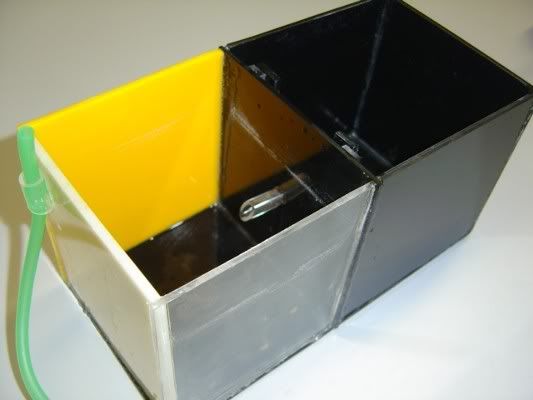- Location
- Baiting Hollow Long Island NY
I often have to go out of town and with pipefish that only eat live newborn brine shrimp that is always a problem. I have a tank sitter that can feed the fish but I can't ask her to hatch brine shrimp every day and sit there while the pipefish eat for an hour so I designed this device which is not quite finished.
The internal mechanism is now sitting on top of the white box that will sit in the tank. (this is just for the picture) Once a day a trap door will open on top of the container and an auto fish feeder will deposit brine shrimp eggs into the container. The door will close keeping it dark inside and aeration will start inside the box. After 36 hours the eggs will hatch and the aeration will stop, a tube on the side will open allowing light in and the shrimp, who are attracted to light will swim out into the tank or I can direct them to my brine shrimp feeder. After a few hours, the tube will again close and the trap door on top will open allowing more eggs to be deposited inside and the process will repeat. All that is required for power is a small air pump which aerates and circulates the eggs and opens and closes the valve controlling the tube where the shrimp swim out. I tested the mechanism and all I now have to do is put it together and position the auto feeder on top which also opens and closes the trap door on top allowing eggs to enter.
Of course it works great on paper but I still have to test the entire thing.

The internal mechanism is now sitting on top of the white box that will sit in the tank. (this is just for the picture) Once a day a trap door will open on top of the container and an auto fish feeder will deposit brine shrimp eggs into the container. The door will close keeping it dark inside and aeration will start inside the box. After 36 hours the eggs will hatch and the aeration will stop, a tube on the side will open allowing light in and the shrimp, who are attracted to light will swim out into the tank or I can direct them to my brine shrimp feeder. After a few hours, the tube will again close and the trap door on top will open allowing more eggs to be deposited inside and the process will repeat. All that is required for power is a small air pump which aerates and circulates the eggs and opens and closes the valve controlling the tube where the shrimp swim out. I tested the mechanism and all I now have to do is put it together and position the auto feeder on top which also opens and closes the trap door on top allowing eggs to enter.
Of course it works great on paper but I still have to test the entire thing.












